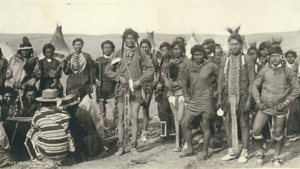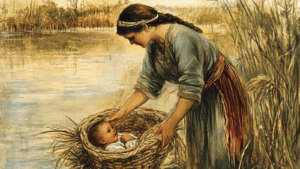Use the following text as a Bible study on your own or with a group.
When you hear the term “difficult conversations,” what comes to mind? If you start to think about people arguing, you are not alone. Perhaps you immediately started to picture a church council meeting that turned into a heated debate. Yet, a difficult conversation is much more than two or more people exchanging harsh words. Difficult conversations often include important topics and can even be positive—or at least lead to positive outcomes.
Expanding our definition and understanding of what is difficult and then using that to build our confidence for difficult conversations can breathe new life into hard situations. After all, remembering a difficult conversation about something otherwise joyful (like a life-changing announcement, a conversation on whether to leave a beloved job for an even better role, or renovating a much-used church sanctuaryA sanctuary is the consecrated area around the altar of a church or temple. It also means a place of safety where one can flee for protection. In the Old Testament, especially in the Psalms, God is referred to as a sanctuary, a refuge from... More), and realizing what went right in that conversation, can build up our skills for the next difficult conversation. We can reexamine past encounters and realize we have more ability to handle difficulty than we may otherwise realize.
Keeping this all in mind, let’s look at two different difficult conversations in the Bible. The goal in using this study is to expand our imaginations about what is possible when talking about hard subjects.
When Moses Was Doing Too Much
MosesProphet who led Israel out of Egypt to the Promised Land and received the law at Sinai. More was no stranger to what we might categorize as extremely difficult conversations, and he was not averse to confronting God or others about what was going on around him. In his experience as a leader, Moses had tremendous responsibilities, and the people in his care continually came to him for help. Throughout this, one person noticed the load of work Moses was under and stepped in.
Read Exodus 18: 13-27, and then respond to the following questions:
- Imagine the scene in verses 13-14. What feelings would you be experiencing if you were Jethro or Moses? What would be difficult for you?
- How does Jethro approach this difficult conversation with Moses?
- What about this approach could work in your church?
- What conversations in your own life does this situation between Jethro and Moses remind you of and why?
Optional: Take this study deeper or use it over several Bible study meetings by expanding this section to include Moses’ version of this situation. You can find his take in Deuteronomy 1:9-18. Brainstorm as a group about how this does or doesn’t change your responses to the questions above.
When the Disciples Just Had to Argue
The funny thing about the title for this part of the study is that each of us can probably think of more than one time that the disciples were arguing. Life in a group, a family, or a team can be like that. In this situation, the disciples have been with JesusJesus is the Messiah whose life, death, and resurrection are God's saving act for humanity. More for multiple times of teaching and have witnessed miracles. They have also been given the responsibility to teach and heal on their own. Despite all of this, they still have quarrels with one another. Much like the original disciples, those of us in the church can witness God working amongst us and still have fights. So, what does this account have to say to us?
Read Luke 9:46-50, and then engage with the following questions.
- Pick a discipleA disciple is a person who accepts and follows the pronouncements of a teacher. Jesus chose twelve disciples (also called "apostles" in some of the Gospels) to follow him and bear witness to his message Anyone who (like them) follows Jesus is engaged in Christian... More and put yourself in their sandals in verse 46. What are you feeling? Why do you think you feel this way?
- How effective do you think Jesus’ response is? How do you imagine the disciples responded?
- The disciples shift to a new topic in verse 49. What do you think makes one difficult conversation turn into another like this?
- Compare and contrast the two different ways Jesus responds to the two difficult topics in the passage.
Optional: Take this study deeper or use it over several Bible study meetings by expanding this section to include how two of the other Gospel writers saw this situation. You can find other accounts of this difficult conversation in Matthew 18:1-2 and Mark 9:33-41. As a group, brainstorm how these passages compare and what else they reveal about difficult conversations. You can also reuse the questions above for the selection from Mark.
Using This Study In Your Church
This study can be used with groups from adult education to a council or with children and youth. If using it with children, youth, or cross-generationally, consider having several people act out the different conversations. For younger children, ask them to draw the emotions of the people involved before, during, and after the difficult conversation that is portrayed. The more ways you can open up the imagination of those studying the text, the better you can create new pathways for difficult conversations to happen in your own community.
- Which of the platforms you use most resembles the authority and perspective of a message delivered from a mountain? How is this good? How might this be a stumbling block?
- Which of the platforms you use most resembles the egalitarianism and perspective of a message delivered from a plain? How is this good? When might this not be appropriate?
- How does the platform of the hearer matter when proclaiming the Gospel? Some don’t have easy access to the internet, and some might not feel comfortable in communal gatherings quite yet, so how can the Gospel be proclaimed in a way that encounters people where they are as much as possible?
- No congregation or faith community can embody every platform with excellence or authenticity. Which platform does your congregation excel in, and where do they struggle? Honestly reflect on the positives and obstacles of this reality.
This Bible study is cross-posted from The Faith+Leader. Faith+Lead offers this way to connect with God through Scripture for personal or congregational use.






